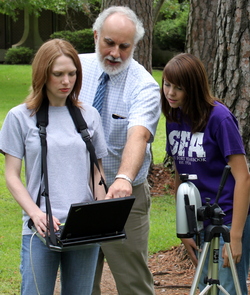 Dr. Kenneth Farrish, director of SFA's Division of Environmental Science in the Arthur Temple College of Forestry and Agriculture, instructs students conducting field research. Graduates of the program are in high demand by employers in both the public and private sectors.
Dr. Kenneth Farrish, director of SFA's Division of Environmental Science in the Arthur Temple College of Forestry and Agriculture, instructs students conducting field research. Graduates of the program are in high demand by employers in both the public and private sectors.Pick up any newspaper or watch any television newscast, and you'll find no shortage of environmental doom and gloom. From oil spills in the oceans to groundwater pollution to radioactive leaks, it seems new concerns about the state of our natural resources arise every day.
At Stephen F. Austin State University, students are learning the skills necessary to not only help address these current concerns but also meet whatever unforeseen environmental issues Earth's future may hold.
"Our guiding philosophy is to produce graduates who are problem solvers - not handwringers," said Dr. Kenneth Farrish, director of the university's Division of Environmental Science in the Arthur Temple College of Forestry and Agriculture.
The division's Bachelor of Science program emphasizes practical application of science to address real-world environmental problems related to both land and water resources and environmental planning and management. The Master of Science program is a collaboration of SFA and the University of Texas Health Science Center at Tyler and offers specialized tracks in both occupational and environmental health and land and water resources.
The division also engages in important research concerning water-related resources and air quality. The staff of the Waters of East Texas (WET) Center promotes interdisciplinary research among SFA students and faculty regarding East Texas water resources and related ecosystems. The focus of air quality research within the division is to better understand the characteristics of air pollutants in animal buildings used in agriculture and to implement control strategies and technologies to limit their release into the environment.
"The program's rigorous science-based curriculum produces graduates who are in high demand by employers, most of which are in the private sector," Farrish said. "The biggest employers of our students are environmental consulting firms, and many of our graduates start out earning $40,000 to $50,000 a year."
Anthony Castilaw '95 is owner and president of Castilaw Environmental Services, a natural resource environmental consulting firm based in Nacogdoches. Currently five other SFA environmental science graduates work with him, and he has hired a dozen alumni since opening the firm in 2005. Many started as part-time employees while still in school.
He said SFA environmental science graduates have a competitive edge because of the hands-on experience they receive in the program and in-depth instruction in areas such as GIS mapping, dendrology, zoology and environmental hydrology.
"I have worked with a lot of other companies that have students from bigger universities, and you can tell right off the bat that they really haven't spent a lot of time in the field," Castilaw said. "With an SFA student, we know we are getting someone who has real-world skills that we can tap into immediately."
SFA senior Jeff Lamb of Henderson will graduate in May and already has a job as an environmental specialist waiting for him at Luminant Energy's Martin Lake lignite mine near Carthage where he completed an internship last summer.
"I have been extremely impressed with the environmental science program and the professors at SFA," he said. "They are not just there to teach. They want to make sure you learn what you need to get a job after graduation."
Employers visit the division regularly to recruit graduates. The division's faculty actively assists in permanent job placement for graduates by arranging on-campus interview opportunities with companies that hire environmental science graduates and by maintaining a regularly updated jobs-available listing on the Web.
"These people actually come to our school looking for us because they know we can do the jobs they need done," Lamb said. "I don't know very many other programs that can say that."
 Axe ’Em, Jacks!
Axe ’Em, Jacks!